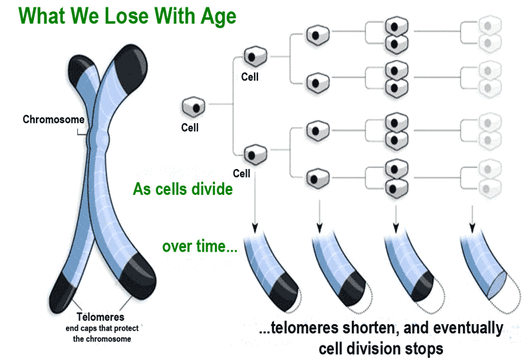
Ageing
Forget “you’re only as old as you feel” or “age is just a number.” Soon, the saying on everyone’s lips might be “you’re only as old as your telomeres are short.”
As researchers learn how to naturally slow ageing to keep us looking and feeling young, they’re looking at telomeres, the parts of chromosomes that control aging, for the answers. And with possible links to Alzheimer’s and Parkinson’s diseases, cardiovascular disease, diabetes and some types of cancer, the stakes are high.
What Are Telomeres?
Telomeres are segments of DNA at the end of our chromosomes. Scientists frequently compare them to the plastic tips of shoelaces that keep the laces together. Telomeres function similarly, preventing chromosomes from fraying or tangling with one another. When that happens, it can cause genetic information to get mixed up or destroyed, leading to cell malfunction, increasing the risk of disease or even shortening lifespans.
Each time a cell divides, its telomeres become shorter. After years of splicing and dicing, telomeres become too short for more divisions. At this point, cells are unable to divide further and become inactive, die or continue dividing anyway — an abnormal process that’s potentially dangerous.
Essentially, this is how our bodies age. As more of our cells lose their telomeres and go out of commission, without others to take their place, the body follows and begins breaking down. And telomeres don’t leave (or shorten) quietly. Their shortening process has been linked with aging, cancer and a higher risk of death.
Each telomere’s ticking biological clock has the potential to alter our lives in drastic ways but, interestingly, it’s not our age that determines when the clock will stop — it’s the length of our telomeres.
Click here to learn about Factors in Ageing
Click here for Natural Remedies to maintain Telomeres length
Forget “you’re only as old as you feel” or “age is just a number.” Soon, the saying on everyone’s lips might be “you’re only as old as your telomeres are short.”
As researchers learn how to naturally slow ageing to keep us looking and feeling young, they’re looking at telomeres, the parts of chromosomes that control aging, for the answers. And with possible links to Alzheimer’s and Parkinson’s diseases, cardiovascular disease, diabetes and some types of cancer, the stakes are high.
What Are Telomeres?
Telomeres are segments of DNA at the end of our chromosomes. Scientists frequently compare them to the plastic tips of shoelaces that keep the laces together. Telomeres function similarly, preventing chromosomes from fraying or tangling with one another. When that happens, it can cause genetic information to get mixed up or destroyed, leading to cell malfunction, increasing the risk of disease or even shortening lifespans.
Each time a cell divides, its telomeres become shorter. After years of splicing and dicing, telomeres become too short for more divisions. At this point, cells are unable to divide further and become inactive, die or continue dividing anyway — an abnormal process that’s potentially dangerous.
Essentially, this is how our bodies age. As more of our cells lose their telomeres and go out of commission, without others to take their place, the body follows and begins breaking down. And telomeres don’t leave (or shorten) quietly. Their shortening process has been linked with aging, cancer and a higher risk of death.
Each telomere’s ticking biological clock has the potential to alter our lives in drastic ways but, interestingly, it’s not our age that determines when the clock will stop — it’s the length of our telomeres.
Click here to learn about Factors in Ageing
Click here for Natural Remedies to maintain Telomeres length